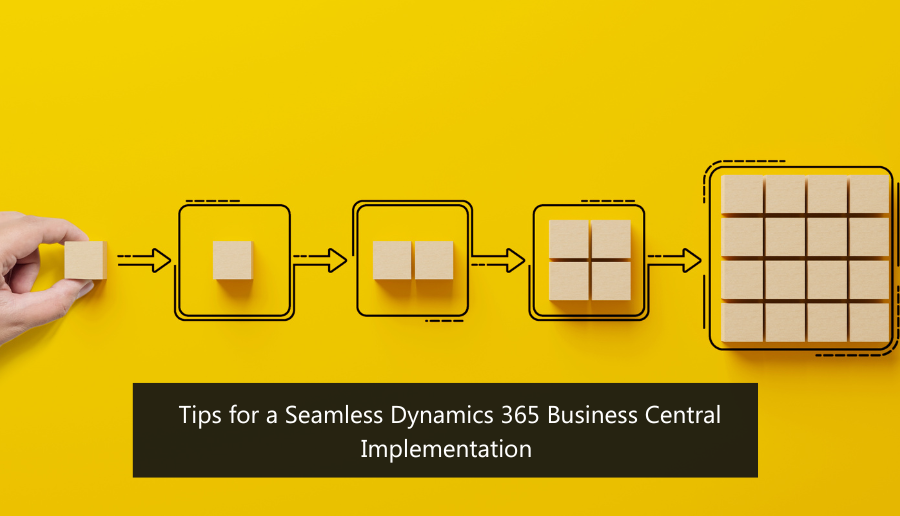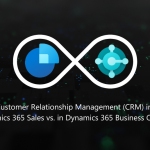Cloud computing is a revolution that’s transforming the Information Technology sector. It lowers the entry barriers to allow businesses to harness the power of technology and maximize productivity.
Moving to the cloud grants your company access to bleeding-edge technology on a subscription model. It lowers your IT-related costs, allowing you to scale your reach and maximize productivity.
Cloud computing also improves your ability to comply with data security and protection legislation, including GDPR. Microsoft Dynamics 365 Business Central is a cloud-based enterprise resource planning (ERP) solution for small and medium-sized businesses (SMBs). Currently, almost 2,500 SMBs in the USA use Dynamics 365 Business Central to manage and streamline their business operations.
It offers end-to-end functionality for financial management, supply chain management, customer relationship management, human resources, project management, and more.
While self-implementing Microsoft Dynamics 365 Business Central may sound quick and convenient, it may present various challenges. You should know these challenges to ensure they don’t disrupt your business operations.
Dig in as we highlight some challenges you will likely encounter while implementing Microsoft Dynamics 365.
Challenges of Implementing Microsoft Dynamics 365 Business Central
While Microsoft Business Central is highly beneficial, SMBs often grapple with various challenges while implementing the solution. Some of the key challenges include:
- Data migration: Moving business data to 365 Business Central can be a complex, tedious process, especially if migrating data from multiple sources. You must properly map and validate the data during migration to avoid data loss and errors.
- Customization: While Business Central offers a variety of custom features, businesses often have unique requirements and workflows. It takes a skilled IT expert who understands the system’s capabilities to configure and customize it to suit your needs.
- Integration: Businesses often integrate their ERPs with other systems and apps, such as CRMs, e-commerce platforms, payment gateways, and more. Integrating third-party systems with Business Central can be a complex undertaking that requires additional development work.
- User adoption: Switching to this powerful ERP solution requires training. Your employees will need adequate training and support before they can use the new solution effectively.
- Compliance/security: Implementing Business Central may trigger security and compliance issues. You need an IT partner to help you configure the new ERP solution to ensure it complies with industry-specific regulatory requirements such as HIPPA, SOX, and GDPR.
Proper planning and execution are essential to overcome the challenges of implementing Microsoft Dynamics 365 Business Central. Working closely with an experienced implementation partner sets the stage for a flawless implementation process. It guarantees a successful implementation and ensures the system lives up to expectations.
Migrating from previous ERP systems, such as Dynamic GP and Dynamics NAV, poses yet another complex challenge.
- Dynamics GP and Dynamics NAV use different data models. You’ll need to migrate and map the data to the new system, which can prove challenging.
- Migrating to Business Central often entails adopting new business processes. The switch can prove challenging to the employees who were used to the old system, requiring additional training and support.
- Many businesses need to retain historical data for compliance reasons. Migrating historical data can be complex and time-consuming, requiring careful planning and execution.
Tips for a Successful Microsoft Dynamics 365 Business Central Implementation
Here are proven tips that guarantee a successful Microsoft Dynamics 365 Business Central implementation.
- Proper planning and goal-setting: Define your business goals and how the new ERP system will help achieve them. Create a detailed project plan with clear milestones, timelines, and defined roles for each implementation stage.
- Ensuring data accuracy and completeness: Conduct a complete and accurate data migration and ensure it’s properly mapped on Business Central. You may need to cleanse or transform the data to ensure compatibility with the new ERP.
- Provide adequate training and support for employees: Proper training and support lowers the learning curve and helps resistance among your employees. Adequate training ensures your employees are comfortable with the new system and can use it efficiently to maximize your ROI. It also helps them get comfortable with any changes in your business processes.
- Maintain ongoing support/communication with stakeholders: You should keep the stakeholders in the loop throughout the implementation process. Inform them of the progress, address any arising issues and concerns, and ensure everyone is on board with the implementation.
- Conduct testing and quality assurance: Testing and quality assurance ensure that the new ERP system functions as expected. Test each stage of the implementation process thoroughly. Identify and address any arising issues and ultimately create a solution that meets all your business requirements.
Working with Gold Certified Microsoft Partners like Technology Management Concepts (TMC) guarantees success. You can easily overcome any challenges that crop up and have the system up and running quickly and efficiently.
Technology Management Concepts is a leading Dynamics 365 Business Central implementation service provider. TMC is a Gold Certified Microsoft partner with more than 30 years of experience in implementing ERP systems.
We have successfully implemented over 1,500 ERP systems and are among the top 1% of Microsoft Dynamics Gold Certified Partners worldwide.
At TMC, we offer tailored implementation solutions to meet your specific business needs and goals, including:
- Business process analysis: Our IT experts will liaise with you to analyze your business process and identify how Business Central can boost efficiency and productivity.
- Customization and configuration: We have a thorough understanding of the Business Central features and functionalities. We can customize the ERP to suit your workflows, business reports, and integration with third-party systems.
- Data migration: We have proven methodologies and expertise in migrating data from legacy systems to Dynamics 365 Business Central. Our process includes data cleansing and transformation while ensuring completeness and accuracy.
- Training and support: We provide world-class training and support to ensure your employees are comfortable with the new solution and can use it effectively.
- Quality assurance: Our rigorous quality assurance ensures each implementation meets all your business needs and helps you maximize your ROI.
Conclusion
Implementing Microsoft Dynamics 365 Business Central successfully allows you to hit the ground running and maximize your business productivity. It provides a comprehensive, integrated environment to manage your financials, sales, operations, and customer service.
A successful implementation streamlines your business processes and allows task automation. It also provides real-time data and analytics, including predictive analytics, to help you make better and informed business decisions. Switching to Microsoft Dynamics 365 Business Central makes your business competitive, responsive, and customer-centric.
As a Microsoft Gold Certified Partner, Technology Management Concepts has the skills, expertise, and experience to implement Dynamics 365 Central seamlessly. You can count on our almost four decades of experience to complete the job quickly and efficiently.
Ready to make the switch to Microsoft Dynamics 365 Business Central? Contact us today!








